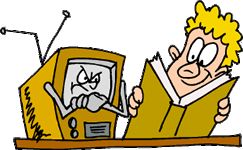Collection Use: Media Literacy: Media, Children, and Society
From computer games and feature films to music and television, media plays a large role in today's society. Does media have a positive or negative impact on our world? You decide.
 Television:
The Great Debate
Television:
The Great Debate
Television has become a great debate. Some people think that television is a mindless "boob tube" creating millions of illiterate "couch potatoes". Others see the television as a way to educate millions and promote literate, active citizens.
Television can combine education and entertainment. For example, Nick Jr.'s Dora the Explorer is the first American cartoon featuring a hispanic character. Children can go on adventures, solve problems, sing songs, and learn Spanish along the way. Children and parents can even visit the Dora the Explorer website for special features such as Dora's Spanish Words of the Day.
Little Bill, Franklin, and Maisy are other favorite Nick Jr. characters. Parents and teachers can explore learning activities at Nick Jr.
Much of the debate related to television is generated by media hype over the issue. On the other hand, many parents are seriously concerned about the amount of time children, teens, and adults spend watching violent programming. Health experts are concerned about the lack of exercise children get when they spend their time watching television, working on the computer, and even reading on the couch.
The Pros and Cons of Video
Video can provide a motivating, challenging, and stimulating learning environment. It can also be a mindless babysitter. Parents and teachers need to become active facilitators to make video a worthwhile learning experience.
Many groups are excited about the positive impact that television can have on children. Explore some examples at the websites below:
- Children and the Media from Children Now - articles explore issues such as diversity, gender, race, and violence
- KidsFirst from the Coalition for Quality Children’s Media
- Media Literacy
Review - articles
- Child Development and Media from Media Literacy
- Government and Media from Media Literacy
- Health Issues and Media from Media Literacy
- Parenting and Media from Media Literacy
- Violence, Sex, and Media from Media Literacy
- Mediascope - articles to raising awareness about media & society
- Media and the Developing Child from The Annenberg Public Policy Center of the University of Pennsylvania
- Teacher
Source from PBS
- Ready
to Learn from PBS - related to school readiness
and educational children's television programming
- Media Awareness from PBS Parents
- Ready
to Learn from PBS - related to school readiness
and educational children's television programming
Turning It Off
Not everyone is thrilled with the barrage of electronic media, particularly television. There is a strong movement to promote good viewing practices and limit television and video viewing.
A number of organizations and online materials are available to explore the pros and cons of television and movies. The following sites focus on concerns about the use of media with children.
 Many
have suggestions for viewing or alternatives to television.
Many
have suggestions for viewing or alternatives to television.
- Children Using Media from Fathom Knowledge Network
- Kill Your Television
- MediaWise from National Institute on Media and Family
- TV Turnoff Network
- Teach with Movies
- The
TV Project
There are also many articles dealing with video games. A few are listed below:
- Children Now
- Fair Play? Violence, Gender and Race in Video Games from Children Now
- Girls and Gaming: Gender and Video Game Marketing from Children Now
- On Video Games from The TV Project
- Top-selling
Video Games "Unhealthy" for Girls, Study Shows from
Children Now
![]() Read the
off-site article Guidelines
for Rating Children's Television from PBS Kid's Ready
To Learn for both sides of the issue.
Read
the off-site article The
Impact of Television & Video Entertainment on Student Achievement
in Reading and Writing by Ron Kaufman. It's only
one of many articles focusing on video and children. Where
do you stand on the issue of television, children, and teens?
Read the
off-site article Guidelines
for Rating Children's Television from PBS Kid's Ready
To Learn for both sides of the issue.
Read
the off-site article The
Impact of Television & Video Entertainment on Student Achievement
in Reading and Writing by Ron Kaufman. It's only
one of many articles focusing on video and children. Where
do you stand on the issue of television, children, and teens?
Connecting Media
 Many children become focused on a particular medium such as music
CDs, television programs, or books. All have a role in our society.
Children need to be encouraged to explore many different options. You
might begin with a book with a gardening theme such as the Caldecott
award winning book Tops and Bottoms by Janet Stevens. Then introduce
a video that shows children how to create their own garden. Use the
Internet to learn about what plants will grow well where you live.
You could even buy seeds online. Listen to music with a gardening theme.
Or. explore nature CDs containing the sounds of birds and other creatures
that live in the garden. Finally, go outside and explore nature by
creating a garden.
Many children become focused on a particular medium such as music
CDs, television programs, or books. All have a role in our society.
Children need to be encouraged to explore many different options. You
might begin with a book with a gardening theme such as the Caldecott
award winning book Tops and Bottoms by Janet Stevens. Then introduce
a video that shows children how to create their own garden. Use the
Internet to learn about what plants will grow well where you live.
You could even buy seeds online. Listen to music with a gardening theme.
Or. explore nature CDs containing the sounds of birds and other creatures
that live in the garden. Finally, go outside and explore nature by
creating a garden.
The key to use of audio and video is balance. People need mental as well as physical stimulation. Promote activities that stimulate all the senses.
![]() Skim the off-site
materials available for Taking
Charge of Your TV from Cable in the Classroom.
You'll need to download the PDF files. This page contains links to
a Parent's
Guide, Presenter's
Guide, Video
Clips (you need Windows Media Player to view these clips), Media
Literacy 101, and other useful materials.
Many resources are available, however think about how you could select
a particular aspect and develop a short "parent's night"
activity that would focus on helping parents "take charge of
the TV."
Skim the off-site
materials available for Taking
Charge of Your TV from Cable in the Classroom.
You'll need to download the PDF files. This page contains links to
a Parent's
Guide, Presenter's
Guide, Video
Clips (you need Windows Media Player to view these clips), Media
Literacy 101, and other useful materials.
Many resources are available, however think about how you could select
a particular aspect and develop a short "parent's night"
activity that would focus on helping parents "take charge of
the TV."